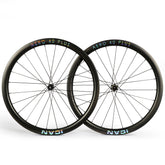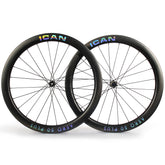Carbon fiber and aluminum wheel sets - which is better?
To improve your bike's performance, you should always first consider the type of wheels you use. The wheelset is arguably the most important component of your bike.
With good, high-quality wheels, even entry-level bikes can become lighter and faster than they originally were. The most common materials for bicycle wheels are carbon fiber and aluminum.
When choosing the best type of wheel for your bike, you also need to consider other factors such as: E.g. the terrain you typically ride your bike on, your budget, the type of cycling you do and your personal preferences.
Let's go over the differences between carbon fiber and aluminum wheels and their pros and cons to help you decide which wheels are a better fit for your bike.
Carbon fiber wheels
This type of wheel is commonly used for high-quality, high-performance road bikes and mountain bikes. You will find that most professional road bikes use carbon fiber wheels.
ICAN AERO is our top tubeless wheelset, ideal for performance-oriented riders. We designed it to combine aerodynamics, stiffness and weight in an affordable package.
Alpha Disc Pro is the perfect, affordable wheelset for anyone looking for high performance suspension. With 72 notches and ceramic bearings for incredibly smooth running, this 6-pawl freewheel gets you up to speed quickly and efficiently. Its most popular depth makes it a perfect choice for long rides.
Carbon fiber is an extremely stiff, light and strong material, which explains why it is the most common choice for high-performance wheels. It is great for improving the acceleration and handling of the bike.
Not all carbon fiber wheels are the same. For some there are differences in the way the wheels and carbon fiber were made. These differences range from the type of resin used, to the density of the fibers used, to the way manufacturers shaped and heated the material.
The differences in the manufacturing of carbon wheels affect their weight, stiffness and durability. However, in general they have the same advantages and disadvantages.
Advantages
- Stiffness
- Look
- Speed and acceleration
- Better aerodynamics
- They can maintain their shape longer
- Ratio between strength and weight
- Efficiency
- Good overall quality
Carbon wheels simply have better overall quality because they offer a good balance between stiffness, performance and weight.
Disadvantages
- Cost
- Lower durability
- They cannot be repaired
- Overheating
- Less environmentally friendly
Carbon rims are less environmentally friendly because carbon fiber cannot be recycled.
Aluminum wheels
On the other hand, aluminum is the most commonly used material for bicycle rims. Except for a few high-end bikes, all bikes are made with aluminum rims.
Aluminum is a light, durable, rigid and affordable material, which is why manufacturers often use it. However, aluminum alone is not enough to be used as a material for bicycle rims. That's why it is alloyed with other metal elements such as zinc, silicon and magnesium.
Alloys can also have different properties. Some are stiffer while others are lighter and have greater elasticity. These differences in different alloys can affect the weight of the wheel, the durability of the rim and the overall quality of the ride.
But just like carbon fiber wheels, there are the same pros and cons.
Advantages
- longevity
Compared to carbon fiber wheels, aluminum wheels do not break easily. They can withstand harsher impacts and still not be damaged.
- Cheaper and more affordable
- Better ride quality
- Easy to repair
- reliability
Aluminum rims are less prone to breakages and defects while driving. They also dissipate heat better, meaning they're less likely to overheat than their carbon fiber counterparts.
Disadvantages
- Harder
Because aluminum wheels are denser and require more material, they weigh more than their carbon fiber counterparts. This means that they are also much slower.
- flexibility
Although their flexibility can be an advantage, it is also very disadvantageous because it makes the wheels less responsive to the rider's wishes. They also deform upon impact, which can be annoying if you have to constantly bend them back into shape.
- Less efficient
The added weight and flexibility of aluminum wheels make riding them less efficient. Compared to bikes with carbon fiber wheels, you need more energy and endurance.







